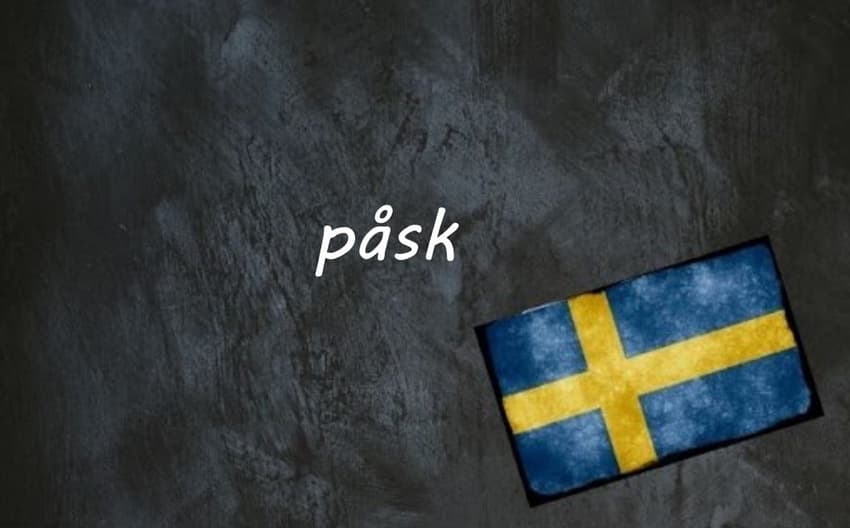Swedish word of the day: påsk

Happy påsk!
The Swedish word for Easter, påsk, may well be recognisable to you if you speak another European language. Unlike in English, but like other Swedish words for festivals, months, and weekdays, it isn't capitalised.
It's a relative of French Pâques, Italian Pasqua, Spanish Pascua, Romanian Paşti, Dutch Pasen and Russian Pascha (Paskha/Пасха), to name a few.
These words all date back to the Greek word Πάσχα (Pascha), which is linked to the Hebrew word Pesach meaning "to pass over". The word pascha was adopted by Latin as the name of the Christian holiday, which became páskar in Old Norse.
- Don’t miss any of our Swedish words and expressions of the day by downloading our new app (available on Apple and Android) and then selecting the Swedish Word of the Day in your Notification options via the User button
Although the English name Easter has a different origin (from Ēostre, the name of a goddess linked with springtime), you will still find relatives of påsk in English dialects, including Pace in Scotland and northeastern England, and Pask in Cornish.
So now that you know where the word comes from, how to use it?
Happy Easter is glad påsk, and you will also find it in lots of festive compound words: påskhelgen (the Easter weekend), påsklov (Easter holiday/break), påskägg (Easter egg), påskgodis (Easter sweets), påskhare (Easter bunny) and påskmust (a fizzy drink in Sweden sold around Easter and spring time).
This year, Easter Saturday, which is the main day of celebrations in Sweden, falls on March 30th.
Examples
Firar du påsk?
Do you celebrate Easter?
Påskharen delar ut påskägg under påsken
The Easter bunny gives out Easter eggs at Easter
Villa, Volvo, Vovve: The Local’s Word Guide to Swedish Life, written by The Local’s journalists, is available to order. Head to lysforlag.com/vvv to read more about it. It is also possible to buy your copy from Amazon US, Amazon UK, Bokus or Adlibris.
Comments (3)
See Also
The Swedish word for Easter, påsk, may well be recognisable to you if you speak another European language. Unlike in English, but like other Swedish words for festivals, months, and weekdays, it isn't capitalised.
It's a relative of French Pâques, Italian Pasqua, Spanish Pascua, Romanian Paşti, Dutch Pasen and Russian Pascha (Paskha/Пасха), to name a few.
These words all date back to the Greek word Πάσχα (Pascha), which is linked to the Hebrew word Pesach meaning "to pass over". The word pascha was adopted by Latin as the name of the Christian holiday, which became páskar in Old Norse.
- Don’t miss any of our Swedish words and expressions of the day by downloading our new app (available on Apple and Android) and then selecting the Swedish Word of the Day in your Notification options via the User button
Although the English name Easter has a different origin (from Ēostre, the name of a goddess linked with springtime), you will still find relatives of påsk in English dialects, including Pace in Scotland and northeastern England, and Pask in Cornish.
So now that you know where the word comes from, how to use it?
Happy Easter is glad påsk, and you will also find it in lots of festive compound words: påskhelgen (the Easter weekend), påsklov (Easter holiday/break), påskägg (Easter egg), påskgodis (Easter sweets), påskhare (Easter bunny) and påskmust (a fizzy drink in Sweden sold around Easter and spring time).
This year, Easter Saturday, which is the main day of celebrations in Sweden, falls on March 30th.
Examples
Firar du påsk?
Do you celebrate Easter?
Påskharen delar ut påskägg under påsken
The Easter bunny gives out Easter eggs at Easter
Villa, Volvo, Vovve: The Local’s Word Guide to Swedish Life, written by The Local’s journalists, is available to order. Head to lysforlag.com/vvv to read more about it. It is also possible to buy your copy from Amazon US, Amazon UK, Bokus or Adlibris.
Join the conversation in our comments section below. Share your own views and experience and if you have a question or suggestion for our journalists then email us at [email protected].
Please keep comments civil, constructive and on topic – and make sure to read our terms of use before getting involved.
Please log in here to leave a comment.